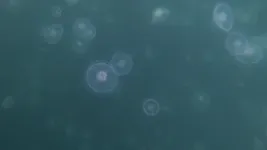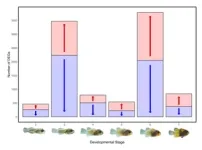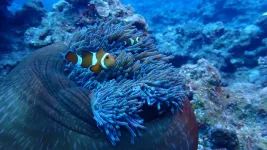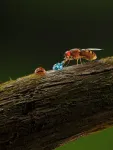(Press-News.org) Drifting along in ocean currents, jellyfish can be both predator and prey. They eat almost anything they can capture, and follow the typical oceanic pattern of large eats small. Now a recent University of British Columbia study on these gelatinous globs suggests jellyfish may get more nutritious as they get bigger.
As jellyfish grow, their size changes largely due to the chances of prey encounter, the length and number of tentacles, and their bells (the umbrella-like part of them). As a result, smaller jellyfish eat phytoplankton, microzooplankton, and eggs, while larger jellyfish can eat all of that plus shrimp and even fish. However, jellyfish are also largely preyed upon by animals in and out of the water. Jellyfish are important prey because they are easy to digest due to their high water content, and they are easy to catch.
“Our study looked more closely to see if there was any information we could draw about nutrition in jellyfish,” said Jessica Schaub, lead author and a UBC PhD student at the Institute for the Oceans and Fisheries and the Department of Earth, Oceans and Atmospheric Sciences.
“This information helps us understand the true value of jellyfish as food. We looked at how the energy that moves through a food web might look as it moves through jellyfish. What they eat, what they are composed of, and how this might affect what eats them.” In Heriot Bay, B.C., for example, the moon jelly may often find themselves being eaten by other jellyfish, fish and other invertebrates.
Schaub, and her team, which includes associate professor Dr. Brian Hunt, who heads the Pelagic Ecosystem Lab at the Institute for the Oceans and Fisheries, took a look at how jellyfish size, diet and nutritional quality all mesh together. Nutritional quality can reflect an organism’s life history — the composition of a jellyfish can change in response to individual changes in diet and physiological changes.
The team, over two one-day periods in July and September 2019, collected 150 moon jellyfish and measured their size. After drying them, they measured the jellyfish for specific compositional elements.
Schaub described what they discovered.
“First, we confirmed what was already known: jellyfish eat bigger prey as they grow, which means they also occupy a higher position in the food web as they grow,” she said. “We also found that some of the concentrations of ‘healthy fats,’ increase as jellyfish grow. We found some evidence that these changes might be influenced by their diet, and as they feed on bigger prey with higher levels of fatty acids, the jellyfish accumulate more of these fatty acids.”
“This means bigger jellyfish might be considered more nutritious,” said Schaub.
The study found size-trends which emphasize just how important it is to consider jellyfish size when we are talking about marine food webs. Including these creatures will not only help their representation in food web models, but can also inform other studies.
Looking towards the future, Schaub described what may come next.
“Our recommendation for future studies on jellyfish predators is to consider size more thoroughly. Feeding on a young, small jellyfish is different than feeding on a larger and older jellyfish.”
Size-based changes in trophic ecology and nutritional quality of moon jellyfish (Aurelia labiata) was published in Ecosphere
END
Jellyfish size might influence their nutritional value, UBC study finds
If jellyfish are 95% water, what makes them such nutritious snacks for so many marine organisms?
2023-03-20
ELSE PRESS RELEASES FROM THIS DATE:
What Darwin couldn’t see: Expedition to uncover invisible life in Galápagos
2023-03-20
An international research team led by the Netherlands Institute of Ecology (NIOO-KNAW) is to search for invisible life in the Galápagos Islands. The diversity of bacteria and other microscopic organisms may not be evident to the naked eye, but it is essential to nature. To the islands' giant daisies, for instance: unique endemic plants that are currently under threat.
How unique and diverse is the invisible microbial life of the iconic Galápagos Islands? That's what the Galápagos Microbiome Project - a group of scientists from the Netherlands, ...
In hot water: Ocean warming impacts growth, metabolic rate and gene activity of newly hatched clownfish
2023-03-20
Future ocean warming and marine heatwaves could impact the growth and development of clownfish during their earliest life stages, suggests a new study recently published in the journal, Science of The Total Environment.
A team of marine biologists from the Okinawa Institute of Science and Technology (OIST) reared the iconic coral reef fish in captivity at water temperatures of either 28°C or 31°C. Temperatures of 28°C represent current summer seawater temperatures in Okinawa, whilst temperatures of 31°C are reached during ...
Researchers study the impact of cancer on Hispanic patients and their caregivers
2023-03-20
Cancer, in all of its forms, is a public health concern responsible for more than 8 million deaths each year in the United States. In addition to its effect on patients and the health care system in general, cancer also places a burden on non-professional caregivers such as family members and friends. This can be especially true for the Hispanic population, where communication barriers, financial difficulties and sociocultural issues can be significant.
In a recently published review article, Jasbir ...
Workers' and bosses' trust in teleworking is key
2023-03-20
In recent years, teleworking – spurred by the implementation of information and communication technologies and the recent pandemic, particularly – has become a feature of many jobs. Many companies have now made this form of working available to their employees, but it is still far from common practice in today's labour market.
Universitat Oberta de Catalunya (UOC) researchers have analysed the different perspectives and perceptions on teleworking, looking at the wide range of ...
First detection of neutrinos made at a particle collider
2023-03-20
A team including physicists of the University of Bern has for the first time detected subatomic particles called neutrinos created by a particle collider, namely at CERN’s Large Hadron Collider (LHC). The discovery promises to deepen scientists’ understanding of the nature of neutrinos, which are among the most abundant particles in the universe and key to the solution of the question why there is more matter than antimatter.
Neutrinos are fundamental particles that played an important role in the early phase of the universe. They are key to learn more about the fundamental ...
Coffee plantations limit birds’ diets
2023-03-20
Cast your mind back to the spring of 2020, when grocery store shelves sat bare of essential items and ingredients. For birds who live in the forests of Central America, replacement of forest land with coffee plantations essentially “clears out the shelves” of their preferred foods, causing them to shift their diets and habitats to survive.
A new study led by researchers at the University of Utah explores a record of birds’ diets preserved in their feathers and radio tracking of their movements to find that birds eat far fewer invertebrates ...
Researchers identify key source of T cell "exhaustion"
2023-03-20
Custom-made to attack cancer cells, CAR T-cell therapies have opened a new era in the treatment of human cancers, particularly, in hematologic malignancies. All too often, however, they display a frustrating trait inherited from the body's own immune system cells: a drastic loss of cancer-fighting fervor known as "exhaustion”. Exhaustion is not only seen in cancer-fighting T cells but is also frequent in the setting of viral infections, such as human immunodeficiency virus (HIV), hepatitis B/C viruses (HBV, HCV) and COVID-19 (SARS-CoV-2).
The lapse into listlessness has diminished the effectiveness of CAR T-cell therapies in some patients and prompted scientists to try ...
How do we make farming better for the planet? Ask women
2023-03-20
When a family of five-ton elephants stomps and chomps its way through your crops, there’s only one winner. And in the central African nation of Gabon, farmers are getting fed up with the giant animals trampling their fields—and their livelihoods.
In conservation terms, Gabon is a success story—protected areas and tough anti-poaching measures have allowed the numbers of critically endangered African forest elephants to stabilize. But with food prices rising, anti-elephant protests have been spiking too. “Some people cannot farm anymore—the elephants are eating so much of their crops,” Gabon’s environment minister ...
Biological BMI: ISB researchers dig deep into data to determine better measures of metabolic health
2023-03-20
SEATTLE – Institute for Systems Biology (ISB) researchers have constructed biological body mass index (BMI) measures that offer a more accurate representation of metabolic health and are more varied, informative and actionable than the traditional, long-used BMI equation. The work was published in the journal Nature Medicine.
For decades, clinicians have relied on BMI as a crude tool to classify individuals as underweight, normal weight, overweight or obese. BMI scores are calculated by dividing a person’s weight in kilograms by height in meters squared. About 30 percent of the population is misclassified by this approach. Despite its limitations, ...
Monell Center team discovers molecular basis for alkaline taste
2023-03-20
PHILADELPHIA (March 20, 2023) – The sense of taste is among the first to come into contact with food before we ingest it, but whether animals can taste basic or alkaline food and how they do it remained unclear until now. A research group led by Yali Zhang, PhD, Principal Investigator at the Monell Chemical Senses Center, recently addressed this significant question, as they similarly did for sour taste in 2021 on the lower end of the pH scale. Their work, published today in Nature Metabolism and highlighted in Nature, identified a previously unknown chloride ...
LAST 30 PRESS RELEASES:
Scientists identify smooth regional trends in fruit fly survival strategies
Antipathy toward snakes? Your parents likely talked you into that at an early age
Sylvester Cancer Tip Sheet for Feb. 2026
Online exposure to medical misinformation concentrated among older adults
Telehealth improves access to genetic services for adult survivors of childhood cancers
Outdated mortality benchmarks risk missing early signs of famine and delay recognizing mass starvation
Newly discovered bacterium converts carbon dioxide into chemicals using electricity
Flipping and reversing mini-proteins could improve disease treatment
Scientists reveal major hidden source of atmospheric nitrogen pollution in fragile lake basin
Biochar emerges as a powerful tool for soil carbon neutrality and climate mitigation
Tiny cell messengers show big promise for safer protein and gene delivery
AMS releases statement regarding the decision to rescind EPA’s 2009 Endangerment Finding
Parents’ alcohol and drug use influences their children’s consumption, research shows
Modular assembly of chiral nitrogen-bridged rings achieved by palladium-catalyzed diastereoselective and enantioselective cascade cyclization reactions
Promoting civic engagement
AMS Science Preview: Hurricane slowdown, school snow days
Deforestation in the Amazon raises the surface temperature by 3 °C during the dry season
Model more accurately maps the impact of frost on corn crops
How did humans develop sharp vision? Lab-grown retinas show likely answer
Sour grapes? Taste, experience of sour foods depends on individual consumer
At AAAS, professor Krystal Tsosie argues the future of science must be Indigenous-led
From the lab to the living room: Decoding Parkinson’s patients movements in the real world
Research advances in porous materials, as highlighted in the 2025 Nobel Prize in Chemistry
Sally C. Morton, executive vice president of ASU Knowledge Enterprise, presents a bold and practical framework for moving research from discovery to real-world impact
Biochemical parameters in patients with diabetic nephropathy versus individuals with diabetes alone, non-diabetic nephropathy, and healthy controls
Muscular strength and mortality in women ages 63 to 99
Adolescent and young adult requests for medication abortion through online telemedicine
Researchers want a better whiff of plant-based proteins
Pioneering a new generation of lithium battery cathode materials
A Pitt-Johnstown professor found syntax in the warbling duets of wild parrots
[Press-News.org] Jellyfish size might influence their nutritional value, UBC study findsIf jellyfish are 95% water, what makes them such nutritious snacks for so many marine organisms?









